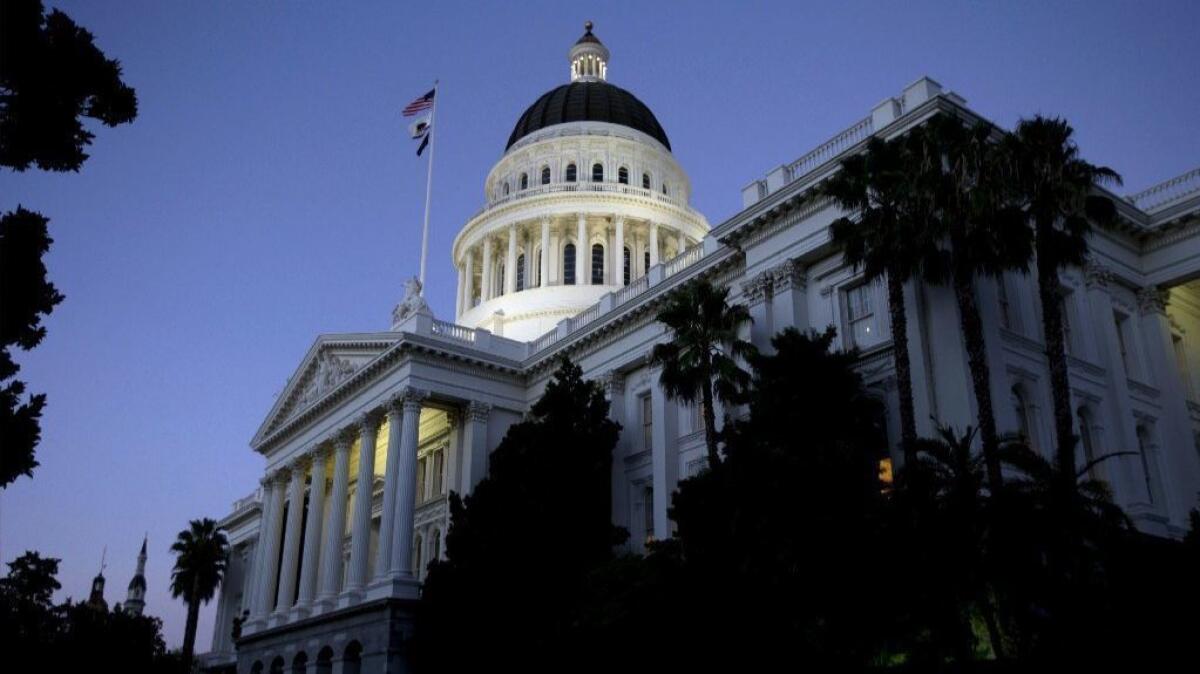Editorial: An unseemly legislative power grab

- Share via
The leaders of the Democratic and Republican caucuses in the state Legislature are among the most powerful politicians in the state. These four lawmakers — currently two men in the Assembly and two women in the Senate — are also among the most important fundraisers for their respective political parties.
But when it comes to deciding how to use the funds they raise, well, they are not so powerful. State law allows lawmakers and their campaign committees to contribute no more than $4,400 to a candidate per election, the same as any other individual donor. By contrast, a political party can donate an unlimited amount to the candidates they endorse.
The difference in contribution limits wasn’t so important not all that long ago, as legislative leaders and the party to which they belonged generally shared the goal of getting as many of their ilk elected to office as possible. But now that the top-two primary has upended the state’s elections, often pitting two candidates from the same party in the general election, there is sometimes disagreement between lawmakers and their party organizations about which candidate to support.
Here’s an example: In 2016, Raul Bocanegra challenged Assemblywoman Patty Lopez (D-San Fernando), who had unseated him from the job two years before. The Democratic Party endorsed Bocanegra, a former rising star in the party, and pumped money into his campaign. (Party rules don’t allow resources to be spent on candidates who don’t get the official party endorsement.) Assembly Speaker Anthony Rendon (D-Paramount) backed Lopez, but there wasn’t a whole lot he could for her other than to contribute a few thousand dollars to her reelection campaign. Bocanegra prevailed, only to resign the following year after an investigation found he most likely engaged in sexual harassment.
While we would like to see more frequent campaign disclosures, we are not fooled.
This dynamic would change dramatically under a surprise bill that legislative leaders are trying to push through in the final weeks of the session to dramatically raise their fundraising and contribution limits. The proposal — which guts and amends an Assembly-passed bill to move up the date of California’s presidential primaries — was submitted just one day before the summer recess, thereby bypassing the normal legislative process of hearings.
Under the measure, each political party caucus in the Legislature would be allowed to create a new fundraising vehicle called a “legislative caucus committee” that could raise unlimited amounts in individual $36,500 increments, just as the state party committees can do, but would be controlled just by the leader of the caucus. The committees could funnel as much of this money as they want into candidate campaign accounts. Presumably their focus would be on helping reelect caucus members, but there would be nothing stopping a caucus committee from supporting candidates in open seats as well — or even opposing an incumbent who had clashed with the leadership.
Enter the Fray: First takes on the news of the minute from L.A. Times Opinion »
We see all sorts of problems with this proposal, starting with the fact that it gives special interests a way to court favor directly with the people who make laws. Right now, if a legislative leader solicits a large check from a corporation or labor union, it goes into the dark hole of his or her political party, which would dole out money in accordance with its bylaws. If a special interest wants to directly contribute to a legislator, it is limited to $4,400 per election, which doesn’t exactly move the needle when campaigns routinely raise 50 or more times that amount.
The bill (Assembly Bill 84) is backed by top lawmakers from both parties, reflecting legislative leaders’ shared interest in amping up their power as well as their mutual frustration with the current limits. The frustration may be especially acute among Democrats, whose party establishment is being shaken up by progressives ready and willing to toss aside incumbents. (See the recent party endorsement of Democratic state Sen. Kevin de León over longtime U.S. Sen. Dianne Feinstein.) But there’s also strong tea party-esque movement in the Republican party that has gone after more moderate members.
The California Democratic Party is vehemently opposed to the proposal, saying it would only deepen the divisions. This bill would be like “filing divorce papers,” as one party official put it during a hearing on Tuesday. The state’s Republican Party has not taken a position, but a plethora of good government groups have, including the League of Women Voters, California Clean Money Campaign and Common Cause. They are nervous about the Legislature making such a major revision to the state’s Political Reform Act in the chaotic final weeks of the session.
The bill’s supporters are touting AB 84 as a transparency and accountability measure because it would require more frequent disclosures by campaign committees. While we would like to see more frequent campaign disclosures, we are not fooled. Transparency is nothing more than the sweet coating to disguise the bitter taste of a power grab.
Follow the Opinion section on Twitter @latimesopinion and Facebook
More to Read
A cure for the common opinion
Get thought-provoking perspectives with our weekly newsletter.
You may occasionally receive promotional content from the Los Angeles Times.









